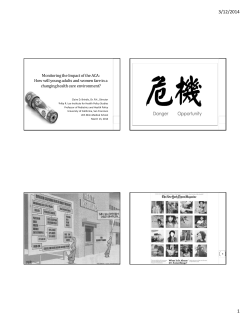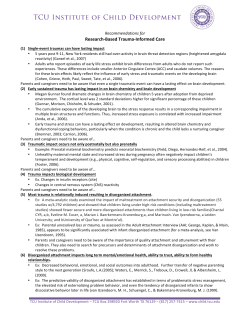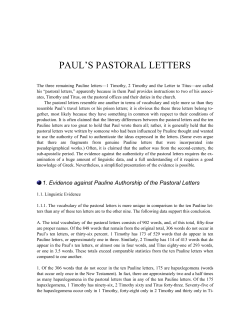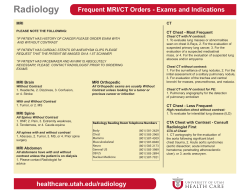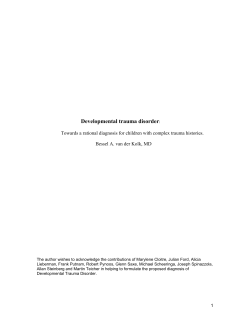
DRAFT SYLLABUS PSYP 625 –Fall 2013
DRAFT SYLLABUS PSYP 625 –Fall 2013 Pastoral Care on the Edge: Fostering Resiliency in Crisis and Trauma Professor Brita Gill-Austern Tuesday 9-11:50 Office Hours: Tuesday 1:30-3:00 Wednesday 2-3 and by appointment Contact information: email bgillaus@ants.edu; Office phone 617 831 2360 PLEASE READ SECRETS OF EDEN BY CHRIS BOHJILIAN BY FIRST CLASS Course Description: This course will provide students with an understanding of models, theories and skills required in crisis intervention and counseling, and show how good psychological and spiritual care can help foster resiliency. It will do three things: focus on both the role of the pastoral care giver and the faith community in times of crisis and crisis prevention, help students understand the common spiritual and psychological reactions to crisis, and show how crisis intervention theories and techniques can be applied to a wide array of crisis situations such as: sudden death, depression, suicide, a diagnosis of an illness, accidents, natural disasters, returning veterans, and abuse in the home. Such crises often provoke a crisis of faith which also will be addressed. The course will involve lecture, discussion, videos, multiple role plays, and group presentations. This course meets the Pastoral Care distributional requirement in the new M.Div. curriculum. The syllabus is a map for the direction we are going; detours or alternate paths may happen as the needs of the class may dictate. Course Objectives: 1) To understand the basic principles of crisis intervention, crisis assessment and common crisis intervention strategies. 2) To identify the dynamics of loss that are at the heart of many crisis situations, and show how spiritual caregivers can help facilitate the grieving process. 3) To examine various models and theories of crisis counseling and intervention with attention to implications for gender, culture, race and class differences. 4) To assist each student in developing a theological and psychological understanding of crisis in human narratives. 5) To learn how to use both counseling interventions (particularly Brief Pastoral Counseling and the ABC Model of Crisis Intervention) and the resources of congregations for prevention, intervention, recovery and fostering resiliency and healing. 6) To learn exercises and spiritual practices that can lessen stress, which assists in coping with crisis. 7) To enhance one’s skills in using the library and important electronic and internet based resources for research. 1 Required Books: Bohlijian, Chris Secrets of Eden. New York: Random House, 2010. Kanel, Kristi. A Guide to Crisis Intervention: Fourth Edition. Belmont, MA: Brooks/Cole: 2011. ISBN 10-0-840-03429-6 Kelley, Melissa. Grief. Minneapolis: Fortress Press. 2010. ISBN 978-0-8006-9661-0 Stone, Howard, ed. Strategies for Brief Pastoral Counseling. Minneapolis: Fortress: 2001 ISBN 978-0-8006-3229-1 Stone, Howard. Crisis Counseling. Nashville: Abingdon Press, 2009. ISBN 0-80006-2760-1 Yoder, Christine The Little Book of Trauma Healing. Intercourse, PA. Goodbooks, 2005. ISBN 156148-507-1 Recommended Books: Holton, M. Jan Building the Resilient Community: Lessons from the Lost Boys of Sudan Eugene, Oregon: Cascade Books, 2011. Sippola, John Welcome Them Home, Help Them Heal: Pastoral Care and Ministry with Service Members Returning from War. Duluth, Minnesota: Whole Persons Associates, 2009. Stone, Howard. Brief Pastoral Counseling. Minneapolis: Fortress, 1994. Roberts, Stephen and Willard, Ashley. Disaster Spiritual Care: Practical Responses to Community, Region and National Tragedy. Woodstock, Vermont: Skylights Paths, 2008. Jones, Serene. Trauma and Grace: Theology in A Ruptured World. Louisville, Kentucky: Westminster, 2009. Library and Schoology Reading All required books are in the library on reserve. Chapters of books that are not required are on reserve in the library by author of book. Journals will need to be looked up in the reference section or through the library’s online e-journal database. When possible all materials required that are not in required books will be put on Schoology and marked with *. Course Requirements: 1) Faithful class attendance. Three absences may result in a failing grade. Please contact professor if you will be absent. 2) Reading assignments completed on time and active participation in the class, in small group discussion and group work. 3) Three (3) page brief reading reflections on assigned reading. Papers must be turned in on the following dates: First Paper October 15th, Second Paper November 5th, Third Paper, November 19th (separate guidelines). 4) A group presentation of an intervention in a crisis situation (separate guidelines). 5) A 10-12 page reflection on a pastoral intervention in a crisis situation (separate guidelines) or Final. Due December 17th 2 Writing Assignments: All papers shall be double-spaced, in 12 pitch, with Times Roman or Calibri font, and have standard margins. Every paper should follow the format of Chicago Manual of Style: The Essential Guide for Writers, Editors or Publishers (accessible online through the library) or American Psychological Association (APA). Specifications for APA Guidelines are at: www.dianahacker.com/resdoc/p04_c09_o.html). Papers that do not meet the applicable requirements, or that are badly written from the point of view of spelling, grammar, citation or intelligibility, may be returned to students for rewriting. Plagiarism: “Whether intentional or unintentional, plagiarism is a serious breach of ethics, and students are held fully responsible for this violation of school policy. Plagiarism may be defined in the following ways: 1) word-for-word plagiarism- (a) the submission of another student’s work as one’s own; (b) the submission of a commercially prepared paper; (c) the submission of work from a source not acknowledged by footnote, bibliography, or reference in the paper itself; or (d) the submission of any part of another’s work without proper use of quotation marks. 2) patchwork plagiarism – the rearrangement of another’s phrases into a new pattern. 3) unacknowledged paraphrase – the restatement of another’s original idea, interpretation, or discovery of fact.” Andover Newton Catalog Grading Policy Written work will be graded with 1/3 of grade based on grammar, spelling and correct form and footnotes, following Chicago Manual of Style or APA and 2/3 based on substance of written work. 1/3rd Three (3 page ) Brief Written Reflections on Assigned Reading 1/3rd Final 10-12 Page Written Assignment 1/3rd Group Case Presentation Grading Criteria will be provided with the Guidelines for Papers and Class Group Presentation. Incompletes will be given rarely and only under truly necessary circumstances. Before each class it is your responsibility to check Schoology and download Power Points for class 3 # On Reserve in Trask Library *On Schoology Outline for Sessions Session #1 September 17th Setting the Context within Pastoral Care for Studying Crisis and Trauma Introduction to Course: Why Study Crisis, Trauma and Resiliency? What is the Relationship between Stress and Crisis? Powerpoint #1 Reading: #Bohlijian, Chris Secrets of Eden #Stone, Howard Crisis Counseling Ch. 2 #Kanel, Kristi A Guide to Crisis Counseling Ch. 1 Session #2 September 25th What is the Role of the Minister in Crisis and Trauma? The Faith Community’s Role in Salutogenesis and Fostering Resiliency Theological Concerns in Crisis and Trauma The Issue of Context and Cultural Sensitivity Powerpoint #2 Reading: * Stone, Howard Crisis Counseling, Ch.1 *Gerkin, Charles Crisis Experience in Modern Life Ch. 1 *Augsburg, David “The Cross-Cultural Counselor: A Theology of Presence” *Mc Lean, Haydn, “Thinking Out Loud: Pondering the Providence of God” in The Journal of Pastoral Care and Counseling, Vol. 62, No. 3, Fall, 2008. * VanKatawyk, Peter God Talk in Therapeutic Conversation Journal of Pastoral Care and Counseling, Vol. 62; No. 1-2, Spring/Summer 2008. Session #3 October 1st Understanding How Crisis Intervention Models Provide Frameworks for Care: The ABC Model of Crisis Intervention Case Study Job Loss Power Point #3 Reading: #Stone, Howard Crisis Ch. 3, 4 #Kanel, Kristi The ABC Model of Crisis Intervention Ch.5 , 4 October 8th – NO CLASS Community Day – Attendance Required Session #4 October 15th First Brief 3 Page Reflection on Reading on ABC Model and Crisis Due When the Crisis is Clinical Depression Knowing the Difference and Connection between Depression and Grief Case Study: Depression Reading: *Karp, David Speaking of Sadness Ch. 1, 2, 3 Recommended Reading: Solomon, Andrew The Noon Day Demon Bringle, Mary Despair: Sickness or Sin Session #5 October 22nd Understanding Loss –The Common Factor in Most Crisis Events The Grieving Process as it Relates to Attachment Theory Group Case Presentation #1 Loss of Parent by Young Adult (ABC) Reading: #Kelly, Melissa, Grief, Introduction, Ch. 1, 2,3 #Kanel, Kris A Guide to Crisis Intervention Ch. 7 Recommended Reading: Niemeyer, Robert, Meaning Reconstruction and the Experience of Loss Attig, Thomas, Learning to Grieve: Relearning the World Worden, William, Grief Counseling and Grief Therapy Session #6 October 29th Meaning Making After Loss Coping Spiritually Group Presentation #2 Diagnosis of Terminal Illness or Chronic Illness (ABC) Reading: #Kelley, Melissa Grief, Ch. 4,5,6 *Pargament, Kenneth The Psychology of Religion and Coping Ch. 10 5 Recommended Reading: *Clark, Anne “Ritual for the Closure of a Life When Life is Artificially Supported, When the Quality of Life has Gone,” Journal of Pastoral Care, Vol. 53, No.4, Winter, 1999. Session #7 November 5th Second Brief Reflection Paper on Kelley’s Grief Due Ethical and Professional Issues for the Pastoral Care Giver Brief and Solution Focused Pastoral Counseling Power Point #4 Group Case Presentation # 3 Teenage Pregnancy (ABC) Reading: #Stone, Howard, Ch. 7 “Elements of Brief Pastoral Counseling” in Strategies for Brief Pastoral Counseling, ed. Howard Stone. #Stone, Howard, Ch. 13, “Theory out of Context: The Congregational Setting of Pastoral Counseling” in Strategies for Brief Pastoral Counseling #Kollar, Charles Allen, Ch.8 “Staying Solution Focused in Brief Pastoral Counseling” in Strategies for Brief Pastoral Counseling, ed. Howard Stone. #Lester, Andrew Ch. 4 “Helping Parishioners Envision the Future” in Strategies for Brief Pastoral Counseling Recommended Reading: Stone, Howard Strategies in Brief Pastoral Counseling Ch. 3 Benner, David, Strategic Pastoral Counseling: A Short Term Structured Mode Stone, Howard Brief Pastoral Counseling Session #8 November 12th Symptoms of Trauma and Treating Trauma Acute Trauma, PTSD, Complex Trauma Power point #5 Group Case Presentation #4 : Domestic Violence (ABC) Reading: #Yoder, Christine The Little Book of Trauma * Bancroft, Lundy, Inside the Minds of Angry and Controlling Men: Why Does He Do That? Ch. 1-5 6 Recommended Reading: Herman, Judith Trauma and Recovery Jones, Serene Trauma and Grace Levine, Peter, Waking the Tiger Rothschild, Babette, The Body Remembers # Kanel, Kris, A Guide to Crisis Intervention, Ch. 10 p. 196-216 * Nienhuis, Nancy, “Thinking Theologically about Abuse and Violence” in Journal of Pastoral Care and Counseling, Vol. 59, No.1,2, Spring/Summer 2005. Fowler, Dawnovise and Roundtree, Michelle, “Exploring the Meaning and Role of Spirituality for Women Survivors of Intimate Partner Abuse” in Journal of Pastoral Care and Counseling, Vol. 63, No. 3,4, Fall/Winter, 2009. Fortune, Marie, Keeping the Faith: Guidance for Christian Women Facing Abuse Sokoloff, Natalie, Domestic Violence on the Margins: Readings on Domestic Violence, Race, Class, Gender and Culture Pellauer, Mary, et. al., Sexual Assault and Abuse: A Handbook for Clergy and Religious Professionals Session #9 November 19th Third Brief Reflection Paper on Trauma or Brief Therapy Due When Trauma Impacts the Whole Community Clergy Self-Care in the Midst of Crisis and Trauma The Rev. Matthew Crebin – Senior Pastor, Newtown Congregational Church, UCC Reading: * Roberts, Stephen, “The Life Cycle of a Disaster,” Ch. 1 in Disaster Spiritual Care: Practical Clergy Responses to Community, Regional and National Tragedy, ed. Roberts, Stephen and Willard Ashley *Roberts, Stephen, “Compassion Fatigue,” Ch. 13, and Raggio and Ashley, “Self Care - Not an Option,” Ch. 2 in Disaster Spiritual Care * Livingston, Canon, et. al., “From Honeymoon to Disillusionment to Reconstruction,” Ch. 8 in Disaster Spiritual Care * Kinsel, John, Working with Children and Adolescents after a Disaster, Ch. 16 or # Holton, M. Jan Building the Resilient Community: Lessons from the Lost Boys of Sudan 7 Recommended Reading: Brenner, Daniel et. al., eds, Creating Spiritual and Psychological Resilience Integrating Care in Disaster Work, New York: Routledge, 2010. FALL BREAK – NOVEMBER 26th – NO CLASS Session #10 December 3rd Suicide Case Study Suicide Prevention (QPR) Group Case Presentation #5- Pastoral Crisis Response to Loss of Faith in Aftermath of Suicide (BPC) Reading: *Quinett, Paul, Counseling Suicidal People, Intro, Ch. 1,2 and Appendix A & B *Townsend, Loren Suicide: Pastoral Responses Ch. 4 # Kanel, Kristi Ch.6 Recommended: Townsend, Loren, Suicide: Pastoral Responses Session #11 December 10th The Crisis of Child Abuse and Its Consequences Spiritual Dimensions and Theological Issues around Abuse Group Case Presentations # 6 Reporting Child Abuse Reading: *Crosson, Cynthia, A Clergy Guide to Child Abuse and Neglect, Intro & Chs. 1-6 #Kanel, Kris A Guide to Crisis Intervention Ch. 10. Session #12 December 17th Returning Combat Veterans and their Families: When Crisis Hits Group Case Presentation # 7 Returning Vet to Family and Church (BPC) Final Paper Due December TODAY Late papers graded ½ grade down per day Reading: # *Sippola, John Welcome Them Home: Help Them Heal: Pastoral Care and Ministry with Service Members Returning from War 8 Recommended Reading: Tick, Edward War and the Soul Armstrong, Keith, Courage After Fire: Coping Strategies For Troops Returning from Iraq and Afghanistan and Their Families 9
© Copyright 2025





